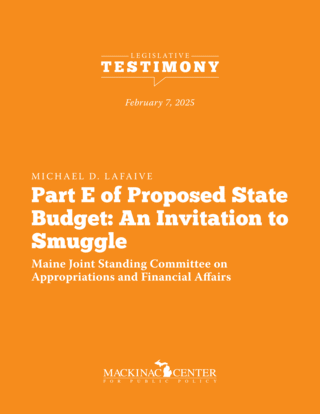
Members of the Committee:
Thank you for letting me testify about the proposed dollar-a-pack increase in the cigarette tax. My name is Michael LaFaive, and I am an economist with a long-time interest in cross-border economic activity, particularly those involving illicit markets.
My colleague, professor Todd Nesbit of Ball State University, and I developed a statistical model first employed in our 2008 study that was designed to measure the degree to which cigarettes are smuggled in and out of American states and into Canada. Using this model and data through 2022, we estimate that nearly 7% of all cigarettes consumed in Maine in 2022 were a function of tax evasion or avoidance.
If the Legislature hikes the excise tax by 50%, our model reports that the state’s smuggling rate will leap from 7% to 14% of the marketplace. That rate would be even higher had we not subtracted cigarettes that are purchased in Maine and smuggled into Canada.
Consumers are not sheep lining up to be sheered of their wool. Many Maine smokers will make runs to New Hampshire to save a buck. In fact, the Granite State rakes in $49 million more in tax revenue than it would absent smuggling. For every 100 cigarettes consumed there, another 31 are smuggled to other locations, most likely to border states with higher excise tax rates.
Calculating the effects of a tax increase is not simply an academic exercise. When Massachusetts banned menthol cigarettes, the Tax Foundation examined tax stamp sales there and in surrounding states like Maine. Sales plummeted year-over-year in Massachusetts, the Tax Foundation found, but they rose in every neighboring state, including Maine. The biggest increases were in New Hampshire (34%), Rhode Island (25%) and Maine (13%).
Obviously a $1 tax increase is not the same as an outright ban. I would expect changes in stamp sales to be smaller than under a ban but still show that this tax increase would enrich the New Hampshire treasury. It’s also unlikely to do much for public health. Those who still smoke when the high price of cigarettes includes a tax of $2 per pack have a very strong preference for doing so, and they will likely turn to cheaper, and often smuggled, products to continue the habit.
There are many unintended consequences of high cigarette tax rates, and smuggling is just one.
Thank you for your time and attention.